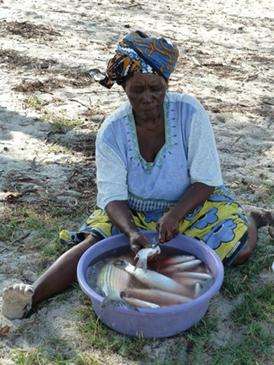Fisheries sustainability linked to gender roles among traders

A new WCS study, published in the journal Ecosystem Health and Sustainability, of fish traders in coastal Kenya shows that women largely occupied fisheries with the lowest profits and are not saving money while working in these fisheries. Management actions that intend to increase profits and sustainability, such as restrictions on use of gear that catch the smallest fish, have the potential to exclude female traders unless management also promotes social equity and gender coexistence.
The study, by Tim McClanahan and Caroline Abunge of WCS Kenya Marine Program, suggests that women have difficulties persisting in the more profitable fisheries, which along the coast of Kenya are often those where low numbers of larger fish are caught. Men largely occupy the profitable fisheries and women are more likely to fill trader roles in fisheries with the lowest profits. These low-profit fisheries generally focus on the catch of a large variety of small fish, often at unsustainable levels. The authors' findings result from a study of 142 traders in 19 Kenyan coral reef fisheries that varied in their management and profitability.
The authors argue that if promoting sustainability and profits are not managed to promote female inclusion, women can easily and unintentionally be excluded. Further, in the absence of good management and social equity programs, women can become the dominant traders and yet fail to make profits or achieve sustainability. This follows increasing awareness on the roles that gender and management can play in fisheries, which is expressed in recent UN-FAO fisheries development themes.
Said lead author, Senior Conservation Zoologist Tim McClanahan: "Ignoring gender in fisheries has the potential to undermine efforts to achieve two social goals: gender equity and fisheries sustainability. Both goals are best achieved when addressed together."
Maintaining resources at intermediate levels where overall production, catch, and fish body size diversity are high, and increasing gear and market diversity will help achieve gender coexistence and sustainability according to the authors. Participating in profitable fisheries requires traders to have capital, use cell phones to communicate with distance markets, and take risks; behaviors that were more common among the male traders in this study. Female traders need capital and greater mobility in order to reduce their chances of exclusion from more profitable and sustainable fisheries. Women in coastal Kenya also need better access to fisheries knowledge and general education to help them take more active roles in fisheries management interventions.
More information: Ecosystem Health and Sustainability, www.tandfonline.com/doi/full/1 … 0964129.2017.1353288
Provided by Wildlife Conservation Society




















